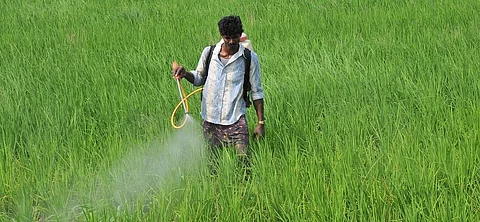

Around three years after the Anupam Verma Committee submitted its recommendations, the Ministry of Agriculture and Farmers’ Welfare has finally issued the Pesticides (Prohibition) Order, 2018, banning 18 pesticides. Of these 18, 12 pesticides have been banned from immediate effect (from August 9, 2018) and ban on another six will be implemented from December 31, 2020. The ban applies to registration, import, manufacture, formulation, transport, sale and use of all these pesticides.
The use of toxic pesticides in India has lately been in news in connection with death of farmers and agriculture workers Yavatmal region of Maharashtra. The Centre for Science and Environment (CSE), a non-profit based in New Delhi, has been campaigning for stricter regulation of pesticides and ban on the most toxic pesticides classified as ‘Class I’ (based on acute toxicity of the active ingredient) by the World Health Organisation. This order bans seven of the 18 Class I pesticides allowed in India, many of which are heavily used. However, there is scope for improvement, the list leaves out two heavily used Class I pesticides: Monocrotophos and Carbofuran.
"Though delayed, this move by the government will address part of the problem. At least some of the heavily used class 1 pesticides would not be allowed after the next couple of years. The government should also consider similar action on other class 1 pesticides, some of which are heavily used," says Amit Khurana, programme director, food safety and toxins, CSE.
Monocrotophos is one of the pesticides connected with the death of farmers in Maharashtra in 2017. The situation is grave since 5,000-7,000 people die every year of poisoning due to accidental intake of pesticides in India and Class I pesticides form about one-third of the pesticides consumed in India. As per the International Code of Conduct on Pesticide Management, jointly released by FAO and WHO, “pesticides whose handling and application require the use of personal protective equipment that is uncomfortable, expensive or not readily available should be avoided, especially in the case of small-scale users and farm workers in hot climates”. It is impossible to ensure use of personal protective equipment by small-scale farmers and farm workers in India. On this basis itself, Class I pesticides should have been banned in India long ago.
A public interest litigation has been filed in the Supreme Court by Kavitha Kuruganti, national convenor, Alliance for Sustainable and Holistic Agriculture, seeking review of 104 pesticides permitted in India but banned or severely restricted in other countries. “The Anupam Verma Committee reviewed 66 pesticides and recommended ban of 18 of them and its successive committee headed by Dr JS Sandhu had the task to review a ban on these 18. Our case pertains to 104 toxic pesticides allowed in India but banned or restricted elsewhere in the world, however, in March 2018, the court ordered us to make our representation to the Sandhu committee which had to be limited to these 18 pesticides only. This ban falls very short of our prayer in the Supreme Court and we hope that the SC looks into the larger matter of 86 more pesticides, serious regulatory lacunae that exist in India and the need to promote non chemical farming,” says Kuruganti.